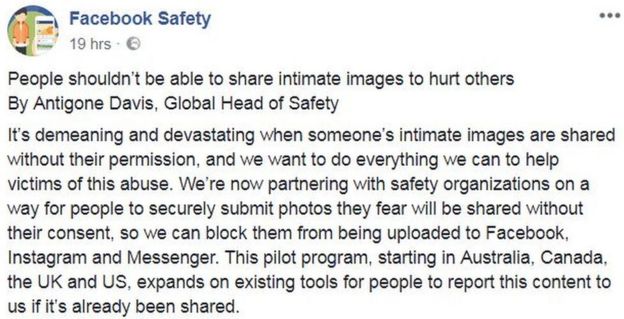Facebook is asking British users to send naked photos of themselves to the social network, to try to stop revenge porn.
If you're worried an intimate photo of you could be shared by someone else, the idea is to get it blocked before it appears online.
Similar technology is used to try to stop the spread of child abuse images.
Facebook's been testing the system in Australia and is extending the trial to the UK, the USA and Canada.
A spokesman told Newsbeat the idea is open to people in the UK now.
Facebook hasn't revealed any details about how the trial in Australia went - but obviously, the idea requires a huge leap of faith.
Would you send sexually explicit photos of yourself to Facebook?
Could you be certain the image would be handled sensitively - and crucially, not shared?
How it works
If there's an image you're worried about, Facebook says you should contact its partner for the trial. In the UK, it's the Revenge Porn Helpline.
Staff there will then get in touch with Facebook and you'll get sent a link to upload the photo.
Who will see my naked photo?
Facebook's Global Head of Safety Antigone Davis told Newsbeat that photos will only be seen by "a very small group of about five specially trained reviewers".
They'll give the photo a unique digital fingerprint - something called hashing.
That code will then be stored on a database. If anyone else tries to upload the same photo, the code will be recognised and it'll be blocked before it appears on Facebook, Instagram and Messenger.
The original photos will not be stored.

Will the idea definitely work?
Antigone Davis admits there's "no 100% guarantee when it comes to photo-matching technologies".
That's because it's possible to manipulate images so they're different to the original. But she says they are getting better at it.
This whole system only works if you actually have the image you're worried about.
If, for example, your ex took a load of photos on their phone and you don't have them, this idea doesn't help.
The UK's Revenge Porn Helpline has seen huge year-on-year increases in reported incidents since it was launched in 2015.
The hotline received just over 500 reports in 2015 and more than 1,000 in 2017.
Latest Stories
-
Cucumbers – Making the most of them
58 minutes -
Revenue growth to slowdown to GH¢209.3bn in 2025; T-bills will not be restructured – IC Research
2 hours -
Deloitte celebrates end-of-year Thanksgiving Service
3 hours -
Inflation to end 2025 between 10% and 12% – Databank Research
3 hours -
Government’s commitment to fiscal consolidation to remain strong in 2025
3 hours -
ImageBureau, April Communications take theatre to Nsawam Prisons
3 hours -
Bird flu kills 20 big cats at US animal sanctuary
4 hours -
Your peaceful conduct saved the country from tension – Clergymen commend Bawumia
4 hours -
A Nite of 1031 Laughs & Music to provide emergency insurance for patrons
4 hours -
Body found in wheel well of United plane after landing in Hawaii
4 hours -
Ghana Armed Forces dismisses viral audio alleging ammunition transfer
4 hours -
Former Hohoe MP Bernice Adiku Heloo passes on
5 hours -
CODEO calls for re-run of Ablekuma North, Dome Kwabenya parliamentary elections
6 hours -
4,155 cholera cases with 35 deaths recorded by December 23 – GHS
6 hours -
Mothers celebrate arrival of Christmas Day babies at Ridge Hospital
9 hours

